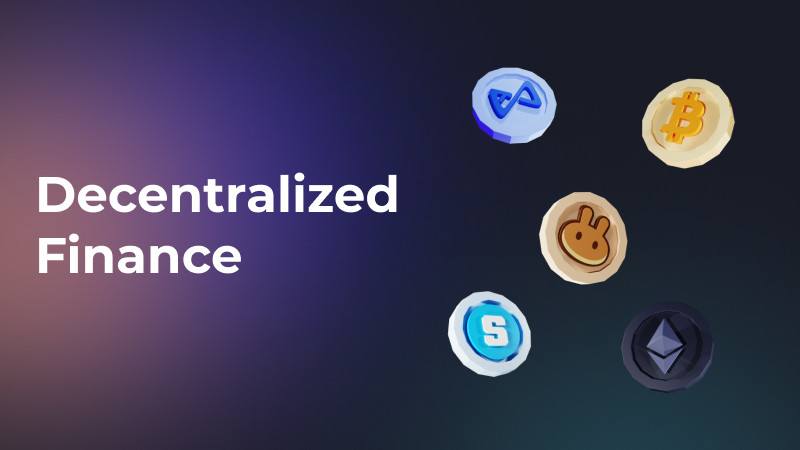What is DeFi and how can I make money from it?

Not so long ago, blockchain assets had only limited use during the development of cryptocurrencies. Although some were able to make millions at this stage, everyone can now make a passive income by knowing a few tips in this area. These assets could be traded or stored in exchanges and digital wallets. However, the introduction of DeFi has opened up new possibilities and allowed you to maximize your returns, even when your assets just stay in your account.
If you've been around the crypto world before, you may be familiar with the term "HODL," which has also become one of the most popular strategies in crypto for buying and storing tokens regardless of price fluctuations. Using decentralized financing, token owners now have many new ways to generate stable passive income by making their idle assets work on lending protocols, liquidity pools, and decentralized exchanges. And that list can be counted on the fingers.
Just like funding fiat funds, cryptocurrency holders can place their digital funds on a wide range of decentralized platforms, earning interest payments. To be more specific, these rates offered in digital assets are higher than in traditional finance, making them an attractive option for most people.
That's why generating passive income with DeFi can be a very valuable investment strategy, especially during times of market turbulence. This little guide will help you learn more about DeFi, its benefits, and ways to create a stable passive income.
What does DeFi mean?
Before we get to the benefits, let's first explore the meaning of DeFi for those unfamiliar with the term. DeFi is an acronym for decentralized finance. Simply put, DeFi represents financial products and services that operate on a decentralized software network without any central authority or intermediary responsible for executing transactions. DeFi's users work within a peer-to-peer (P2P) concept.
DeFi is known as a more attractive and efficient alternative to the traditional financial system run by financial institutions such as banks, central banks, credit unions and others. Unlike conventional systems, the DeFi protocol supports transactions, including payments, loans and transfers, that are executed in a blockchain register and work through smart contracts that are self-executing when all conditions are met.
With these technologies, DeFi appears to be creating a global financial system that will promote transparency, reduce bureaucracy, increase security, and be cheaper and more accessible to all.
What are the benefits of DeFi?
Like cryptocurrencies, DeFi has been called an alternative to fiat-based platforms. With this technology, financial transactions such as lending, issuing loans and placing bets are done without the need for an intermediary. Because DeFi platforms use smart contracts for transactions, they also offer higher efficiency, lower costs, and potentially minimize the risk of default by debtors. Experts believe that by challenging conventional fiat currencies, DeFi will open up a new world of financial opportunities available to everyone.
How does DeFi's passive income work?
DeFi has quickly become one of the most attractive applications of blockchain technology. These platforms allow anyone who is interested in the world of cryptocurrencies but is not ready to make large investments - especially in this market situation - DeFi's passive income opportunities can be a great choice. In addition, there are many apps and software tools, such as valktech, to help users track their assets and increase their income online.
While there are many ways for users to make passive money with DeFi, below are only the most effective, safe and affordable.
Deposit a crypto-deposit for APY
One of the easiest ways to earn passive income with DeFi is to earn interest in exchange for depositing your crypto or other digital assets into an account. This works similarly to having a savings account for fiat money, which also offers interest. Since interest rates in the fiat market are low in today's environment, DeFi can be a great choice. Using these decentralized platforms, you have a much better chance of making higher profits than high street banks.
DeFi lending
Lending is also a well-known method of generating passive income with decentralized finance. That's why users can find many platforms specifically designed for the type of cryptocurrency lending protocol.
Working similarly to betting, users can earn passive income through DeFi lending by depositing their assets and cryptocurrency into an account over a period of time. This works by lending your assets to the platform, which allows you to lend them to other crypto-borrowers. This concept also provides you with a mutual interest. Ideally, smart contracts will distribute your assets in proportion to the number of assets you own.
Liquidity pools
Yields are a great way for anyone to own assets rather than use them. This method works by parking assets in exchange for interest or other types of rewards. In other words, DeFi platform users can place their assets in a liquidity pool. When these assets are locked in using a smart contract in a decentralized application (Dapp), users receive a commission or interest, allowing them to freely use their assets on that platform by borrowing and selling.
Become a liquidity provider
The last way to earn passive income through DeFi is to become a liquidity provider (LP). Unlike rates and yields, which involve using your assets to validate transactions or fund crypto loans, liquidity providers operate on a different principle. They have to ensure that tokens are exchanged in a more efficient and faster way on a decentralized exchange (DEX).
Final thoughts
As you can see, DeFi will be a great alternative to conventional financial platforms, increasing efficiency, speed, security and transparency. In addition, DeFi platforms also allow users from all over the world to earn stable passive income with higher interest rates than with fiat savings. Given the current state of the crypto market, investing in DeFi is the best way to preserve the value of your digital assets in the long run.